ckaihatsu wrote:
But here's the thing -- *you* consider 'fruits of their labor' to include the 'immortality' of capital, as the 'yardstick' / measurement of the economic exploitation of human labor, per hour of every day.
Truth To Power wrote:
No, I have identified the fact that property in the fruits of one's labor cannot enable exploitation of labor, while property in others' rights to liberty, like slave deeds, land deeds, and IP monopolies, makes exploitation of labor both possible and inevitable. Even Marx understood that capitalist exploitation of labor had to await the Enclosures, which deprived workers of their liberty to use land to survive, forcing them to seek wage labor with employers in the towns on whatever terms they could get, or starve to death.
You're sidestepping the simple empirical fact of *accumulations over generations*.
[QUESTION 001] How would 'corporate personhood' / corporate power, be *handled* exactly, within the polity of your dreams.
[QUESTION 002] How would new incoming generations be *raised* in relation to the pre-existing world of money / resources, particularly regarding their 'earningness' / morality / material-contribution to society?
TLDR: What are the kids owed, and what's expected of anyone / everyone?
ckaihatsu wrote:
In other words it's not even about the immortality of flows of capital, but moreso it's about the cash-*flow*, which can't really be allowed to *slow down* because then it's obviously performing at less than its full potential.
Truth To Power wrote:
No, that is absurd garbage with no basis in economic fact. Unlike the return to privileges like slave deeds, land deeds, and IP monopolies,
Truth To Power wrote:
the return to producer goods tends to be competed away.
https://en.wikipedia.org/wiki/Tendency_ ... it_to_fallTruth To Power wrote:
The principal beneficiary of capitalist exploitation of labor is therefore the privileged, especially the landowner, not the factory owner.
Wouldn't that depend on the respective [1] *rentier* values (land / real estate), and the [2] *equity* values (factory / mass production) -- ?
For any given scenario / situation, that *ratio* ([equity] over [rentier]) may vary *widely*, so it's kinda rents-vs.-labor-exploitation, in terms of competitiveness over a piece of the labor value pie.
After the uncontrollable yawning and little nap you'll have processed in your sleep that if the company is *large* and has a *big* footprint on the overall real estate then maybe it has big *equity valuations* while maybe vacant farmland *doesn't* so much.
(Also: Progressive-vs.-reactionary, in terms of costs to the *worker* / employee, to their *wages* -- in relation to what the product of their labor is *sold* for, for revenue.)
[11] Labor & Capital, Wages & Dividends
---
Also, I gotta add that the worker is not *productive* on any given *rentier* property, like land / real estate (one's own *housing*), or any other assets and/or resources.
The worker *is* productive / producing commodities, while doing what they're being *paid* to do. Would you like to take a moment here to *reflect* on this reality, TTP -- ? (grin)
I *say* that because you *eschew* the labor theory of value by simply turning away from it. All you can see is the pool party of people, without having a clue as to where they all came from.
ckaihatsu wrote:
Here's a recent treatment:
Mainstream neoclassical economics is curiously only concerned with valuations *after* the initial production process, and its cost, for the freshly minted commodity off the assembly line. What *they* call 'the secondary market' (used books, for example) is actually the *third* market, because the *first* market was whoever put the initial production of the commodity into motion, for the initial production of the commodity. The first *customer* is actually the *secondary* market, per the reader's confirmation, the customer being the first to receive the mint-condition product.
So marginal utility only addresses *post*-production, *consumer*-intrinsic 'diminishing returns', like anything else in the material world, for anything materially bought / invested-in.
Here's my standing critique of the currency face-value / 'exchange value' under capitalism:
You're saying 'supply-and-demand', but you haven't addressed the point about this that I've raised previously, about money having to do a physically-impossible *triple-duty* of valuating these three *different* economic components: [1] manufacture, [2] supply-and-demand, and [3] the consumer's own subjective use-value, or 'utility'.
viewtopic.php?p=15253101#p15253101
viewtopic.php?p=15257425#p15257425
---
Truth To Power wrote:
Marx merely pretended that the most successful factory owners were the entire population of factory owners, and that the great majority of factory owners, who just broke even or lost money, did not exist.
I think Marxists-types don't include the *broadcast of the horse race* because it's the *material gain* aspect itself -- a distinct social privilege -- that's enabled by *any* political economy, like that of capitalism.
Social Production Worldview
---
ckaihatsu wrote:
People's *incomes* depend on the machinations of equity capital, unfortunately, for jobs and the resulting actually *socially productive* segment of production, and/or all other kinds, under capitalism.
Truth To Power wrote:
No, that's just more absurd Marxist garbage contrary to economic fact. People's incomes depend on how much of their wages the privileged are legally entitled to steal from them, not anything the owners of producer goods do. Google "Law of Rent" and start reading.
You're absolving equity capital of all wrong, and I just can't live in that worldview, TTP. Rentier capital extracts rents (rent for housing) and interest payments on capital (loans / debt) (necessarily-non-productive assets and resources) (from the *pre-existing* overall economy), at the same time that *equity* capital exploits surplus labor value from every worker, every hour of the workday -- but at least it alone has the power of 'enabling' / controlling industrial mass production.
ckaihatsu wrote:
Capital here takes on godlike powers -- all hail equity capital!
Truth To Power wrote:
Yes, the miraculous difference between the modern worker's standard of living and the Neolithic one has been caused by those who contributed the producer goods that increased production.
At the expense of the *worker*:
A worker who is sufficiently productive can produce an output value greater than what it costs to hire him.
https://en.wikipedia.org/wiki/Surplus_value
---
Truth To Power wrote:
Godlike powers indeed.... though evil, lying Marxist know-nothings pretend that there is no difference between the owner of producer goods getting rich by making everyone else richer and the privileged -- especially landowners -- getting rich by making everyone else poorer.
---
Truth To Power wrote:
Which is pretty funny, coming from a Marxist. The process of changing from injustice to justice is actually simple: stop stealing, and require the privileged to pay for what they are taking. All that's needed is political will.
ckaihatsu wrote:
Still fairy-tale if you're pivoting everything around *equity* values.
Truth To Power wrote:
You made that up. The only relevant values are free market values.
I've got you on record *somewhere* acknowledging the distinction between equity capital, and rentier-type capital -- you're back to twisting and turning and dancing-between-the-raindrops again.
ckaihatsu wrote:
The meritocracy never existed,
Truth To Power wrote:
But contribution to production merits a commensurate share of production.
In the production process itself (for that moment or so that it takes on assembly lines) equity values remain mostly *intact* -- and, by extension, over time. But such 'dead labor' valuations are just a *totem*, a *relic*, for some approximation of matching societal material supply, to non-need-based economic 'demand'.
[10] Supply prioritization in a socialist transitional economy
---
ckaihatsu wrote:
and the *dollars* (etc.) its 'value' is measured in -- FIRE superstructural / social-convention aspects, basically -- are just as culturally biased, one could safely say.
Truth To Power wrote:
I'm not advocating, defending or justifying the current system but an entirely different and incomparably superior one.
It's single-issue 'single-landlord' politics, while deifying *equity* valuations in your rhetoric.
---
ckaihatsu wrote:
The stealing is that of the workers' surplus labor value.
Truth To Power wrote:
 So when the factory owner's contribution of producer goods increases production tenfold using exactly the same amounts of land and labor, with the result that the worker's wage is doubled and the landowner's rent quintupled while the factory owner barely breaks even, it is somehow the factory owner who is stealing the worker's surplus value...?
So when the factory owner's contribution of producer goods increases production tenfold using exactly the same amounts of land and labor, with the result that the worker's wage is doubled and the landowner's rent quintupled while the factory owner barely breaks even, it is somehow the factory owner who is stealing the worker's surplus value...?
Nice picture -- can I do a Google Images search for that?
You simply have the quintessential worldview and mindset of a *capitalist* -- please see if you can address my 2 social-*logistical* points from earlier.
---
Truth To Power wrote:
Somehow, I kinda figured it'd be something like that...
---
ckaihatsu wrote:
Organizational / network considerations aside, what's the *administration* here?
Truth To Power wrote:
Voters.
*Now* we're getting somewhere.
What government-type *services* does this voter-supported administration *host*, TTP?






 So when the factory owner's contribution of producer goods increases production tenfold using exactly the same amounts of land and labor, with the result that the worker's wage is doubled and the landowner's rent quintupled while the factory owner barely breaks even, it is somehow the factory owner who is stealing the worker's surplus value...?
So when the factory owner's contribution of producer goods increases production tenfold using exactly the same amounts of land and labor, with the result that the worker's wage is doubled and the landowner's rent quintupled while the factory owner barely breaks even, it is somehow the factory owner who is stealing the worker's surplus value...?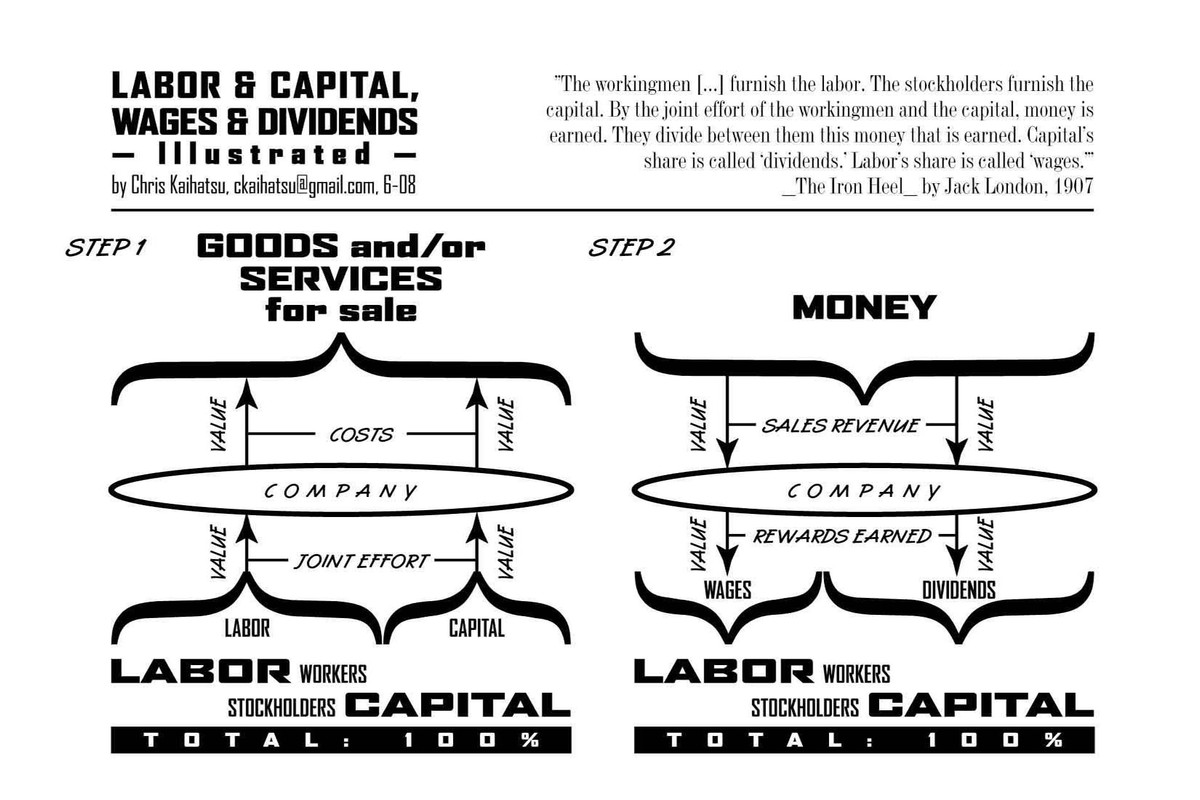
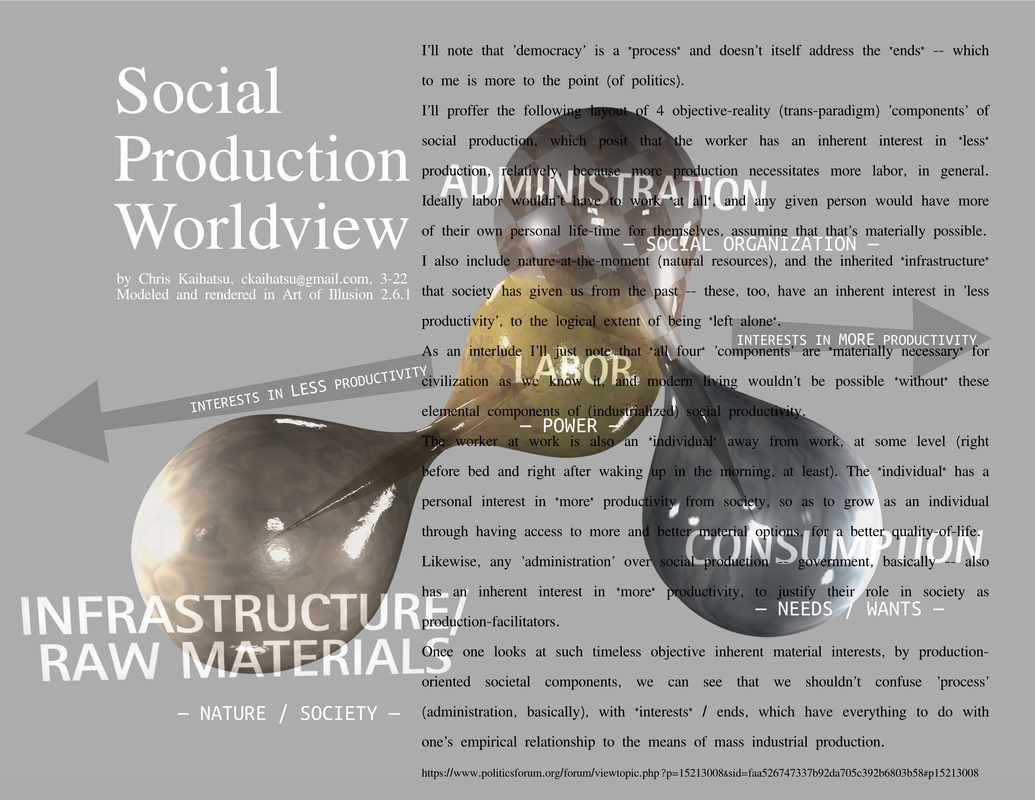

 You are being silly again.
You are being silly again.

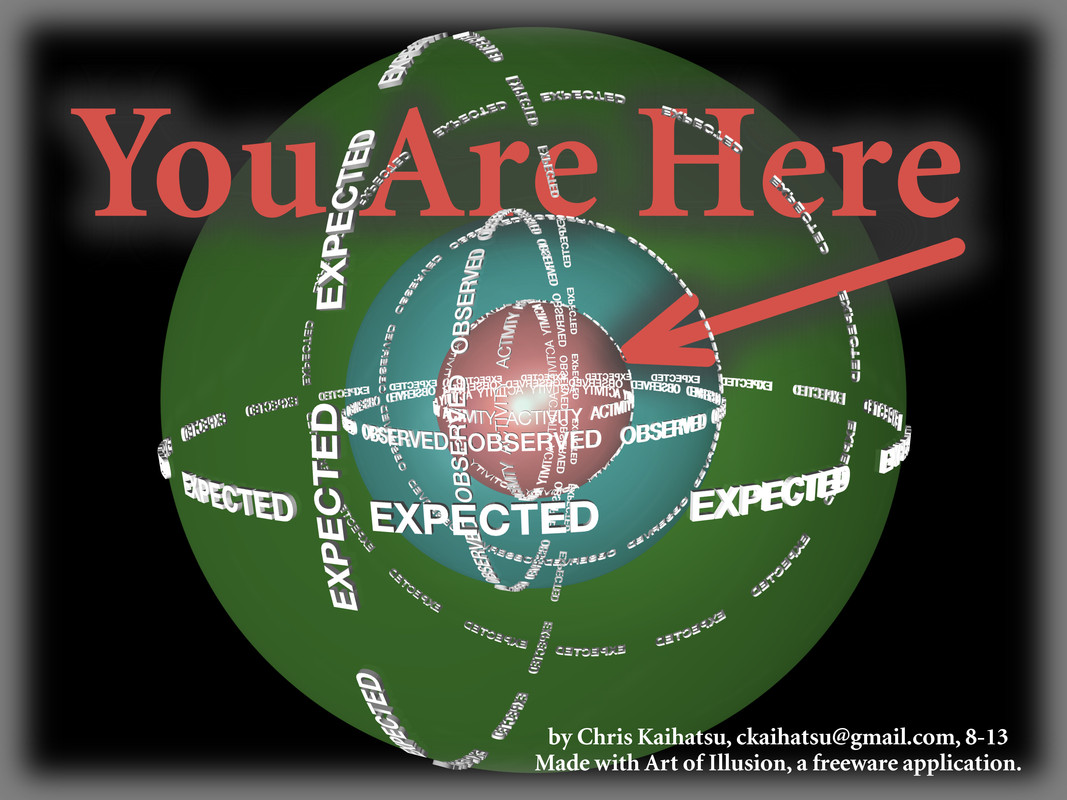
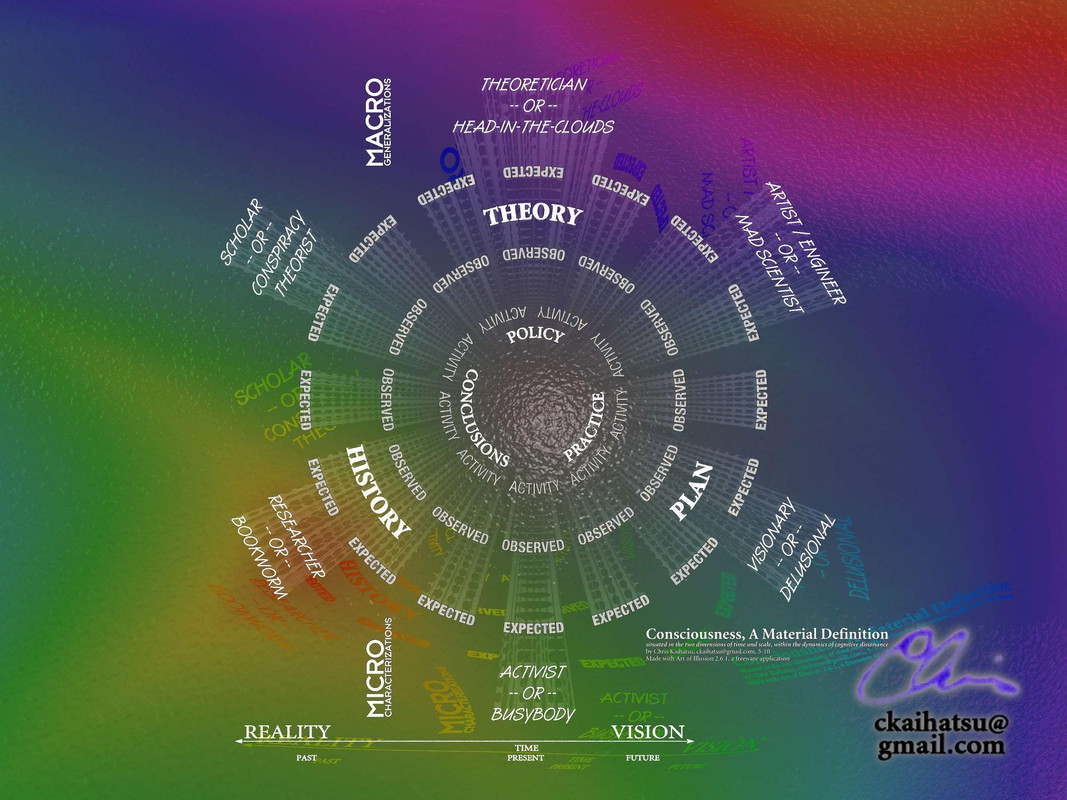
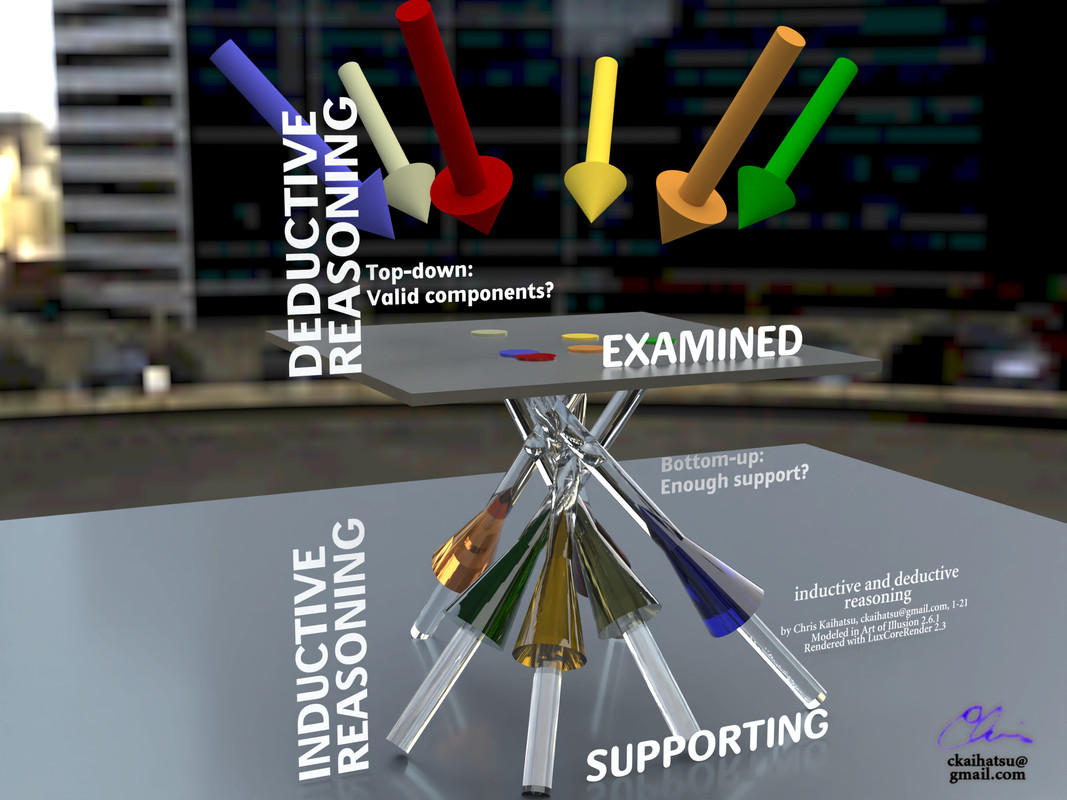
 - By KurtFF8
- By KurtFF8 - By Rancid
- By Rancid - By Tainari88
- By Tainari88